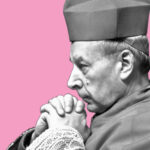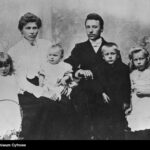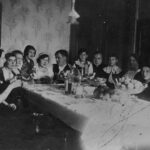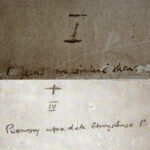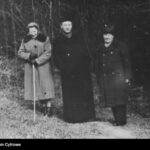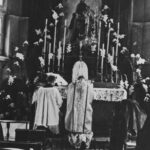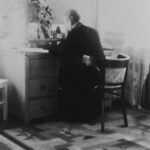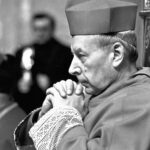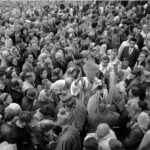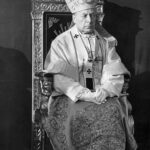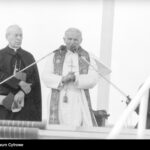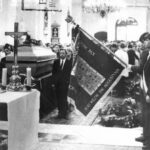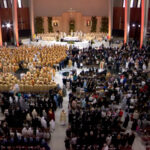Stefan Cardinal Wyszynski – a biography 1901-1981
Stefan Wyszynski was born on August 3, 1901 in Zuzela on the Bug River, a village on the border of Mazovia and Podlasie in Poland. He was the son of Stanislaw, a farmer and local organist, and Julianna, née Karp. The family had some children and their devotion was centered on devotion to Mary, the Most Holy Mother.
Nurturing Polishness
It should be remembered that this was a time when Poland had not been on the map of Europe for over a century, the country was divided by the three partitioners. The national identity was preserved through the preservation of the achievements of the Romantics, especially Mickiewicz and Slowacki, Chopin and Moniuszko, the national uprisings and their leaders, through the activities of the Church and the Roman Catholic clergy, and above all – in families, where the Polish language was cultivated in daily prayer, stories and reading.
Today, slightly more radical voices appear, suggesting that the survival of the Polish language at a time when the occupants imposed Russian or German in offices and schools was due primarily to the priests and women of that difficult period. Why?
The period of Napoleonic wars, the time of partitions and uprisings, and finally World War I meant that Polish homes lacked the strongest and healthiest men. Some fought in the uprisings, others in the tsarist army, the army of the Emperor of Austria-Hungary or Germany, and still others were sent to Siberia in Russia as a punishment for their patriotic activities. It is difficult today to even estimate the number of men who never returned to their families. It was an extremely difficult time for Poles, for the intelligentsia and elite, but also for the average inhabitants of villages and towns.
We can conclude that the future bishop of Lublin and Primate of Poland, Cardinal Wyszynski, was shaped by the cultural, religious and historical context of that time. He became a statesman, a clergyman and a patriot, fighting for Polishness and the survival of the Christian faith in the nation.
- 1906, z rodzicami i rodzeństwiem
- 1937, przyjęcie weselne siostry
- 1953, Rywałd Królewski
- 1953, Komańcza, z ojcem i siostrą
- 1956, Komańcza
- 1956, Komańcza
- 1966, Gniezno
- 1966, Częstochowa
- 1966, Gniezno
- 1979, Gębarzewo
- 1981, Warszawa
- 2021, Warszawa
The Road to Priesthood
In 1910 the Wyszynski family changed their place of residence, moving to Andrzejewo, a slightly larger town in the same part of the country. There Stefan attended school with Russian as the primary language of instruction. He was expelled from school for disobedience.
In the same year his mother, dying, expressed her wish that he become a priest.
In Andrzejewo he received the next sacraments of Christian initiation: first communion and confirmation.
When World War I broke out, he attended a private commercial school for men in Lomza. From 1917 to 1920 he was a student at the Pius X Lower Seminary in Wloclawek.
In 1920, he entered the major seminary in Wloclawek.
He was ordained to the priesthood a little later than his fellow students, due to a lung disease, on August 3, 1924, which was also his birthday. The ceremony took place in the Chapel of the Mother of God in the Cathedral Basilica in Wloclawek. The consecrator was Bishop Wojciech Owczarek. The Primate Mass was celebrated by the neo-presbyter Rev. Stefan Wyszynski at the Jasna Góra Sanctuary, which by many is referred to as the spiritual capital of Poland.
Pastor and chronicler
When he recovered, he began working as a vicar at the Cathedral Parish in Wloclawek and became editor of the diocesan newspaper, “Słowo Kujawskie”.
From now on he will combine pastoral ministry with teaching and the written word. He left behind a wealth of texts, diaries and visitation records and other writings that shed light on the past era, the level of religion, the prevailing social relations in Poland over many decades.
He recorded everything with precise accuracy, writing down dates, times, he even paid attention to the weather.
Son of the epoch
He was a son of the epoch, which is treated by contemporary critics as a reproach. Indeed, Stefan Wyszynski grew up and was formed in a culture and society that gave many privileges to the clergy. This resulted not only from the provisions of the Concordat between the Holy See and the Republic of Poland of 1925, but also from the achievements of eminent Polish clergymen of the Enlightenment, creators of modern thought and education, patriots and social activists, their social, intellectual and economic positions.
Analyzing the language of religious communication in Stefan Wyszyński’s texts, it is not difficult to notice the distance from the laity and the secondary role of the laity, the focus on the Roman Catholic Church – also, and sometimes primarily, as an institution.
This is also evident in the personal testament that was read at his funeral in May 1981.
“A royal funeral” – Why?
The Primate’s funeral is said to have been the last “royal funeral” in Poland, with all
the splendors due to persons holding state functions. On 31 May 1981 thousands of people, also non-believers, gathered in Warsaw.
The funeral Mass at Victory Square was presided over by Cardinal Agostino Casaroli, Cardinal Franciszek Macharski read the homily prepared by John Paul II. He wished, among other things, that the pain of the Poles would be transformed into hope. He called the deceased a defender of God and Poland. For the funeral arrived, among others, the Archbishop of Munich and Frisia, Joseph Ratzinger. The funeral was broadcast by radio and television to reduce the number of people in the capital, because the communist authorities feared riots.
The fact that a man coming from a peasant background had such a funeral was solely due to his unprecedented influence on the fate of post-war Poland. Hence the term – the Primate of the Millennium.
It was recognized that the period after World War II in Poland was one of the most difficult in the history of the nation. By the leaders of world politics, Poland was pushed into the Soviet sphere of influence, which meant for many millions of people living behind the Iron Curtain for many decades of the twentieth century. And communism as practiced by the Soviets was a criminal system that did not care about the individual, particularly their freedom in any dimension.
Wyszynski ensured that Poland, as the only country in the Soviet sphere of influence, did not become massively atheized or submissive to the communist authorities in Warsaw, which were subordinate to Moscow. His attitude, especially during the many years of his imprisonment by the communists and his detention in inhuman conditions, made it possible to preserve in the minds of many people the faith in regaining freedom.
Primate Wyszynski’s steadfastness, direction of action and the teachings of the Roman Catholic Church in Poland under his leadership laid the groundwork for the development of free labor movements, strikes and the creation of “Solidarity”.
It should be added that the tightly closed borders of the totalitarian Polish state, People’s Republic of Poland, did not even allow for free contact with the Pope. Paul VI did not receive permission from the communist authorities to come to Poland for the celebrations of the Millennium of Christianity, so Primate Wyszynski was given special rights so that the communists could not influence the decisions of the Holy See. By the way, the Pope and Vatican officials did not understand the situation of Poland or the Roman Catholic Church in Poland. The perspective of Western European societies was far different from that of the countries behind the Iron Curtain and it was difficult for their representatives to understand the situation of Poland and Poles. This made the task of Primate Wyszynski, now the formally Blessed of the Roman Catholic Church, all the more difficult.
Wyszynski’s tough stance might be today criticized especially by circles unfavorable to the Church and religion. However, they may have resulted both from the cultural and social context of the time, but also from his deep convictions, which led him to fulfill the role of spiritual leader of the nation in the most difficult years of communist terror in Poland, in the years after World War II.
Criticism of the Church
In the era of the anti-eschatological revolution and accelerated secularization, manifestations of “cancel culture” in relation to the Roman Catholic Church in Poland. Accusation apear also against influential clergymen, including those living in the past times, including Cardinal Wyszynski. More and more accusations based on fake news appear in relation to their role and attitude towards, among others, citizens of the Second Polish Republic of Jewish origin.
The evaluation of the person and work of Cardinal Wyszynski, especially in the environments outside the Church and unfriendly to the Church, is influenced by the infamous and scandalous behaviour of some clergymen in Poland in the last decades, including the hierarchy, and also by the lack of understanding of what life was like in Poland in those oppressive and inhuman times.
At the same time, this criticism may be connected with the attitude of the hierarchy and the church institutions to the various formations of governments in Poland after 1989. The errors in the area of religious communication committed by the leaders of church life in Poland may also have some significance in this process. Some leaders probably do not notice that the Roman Catholic Church has lost its position as a key institution of social influence in the country and Europe.
Change of perspective
From the perspective of security, including economic security, many Poles no longer perceive the importance of Cardinal Wyszynski, and often downplay his role in Poland’s restoration of freedom in 1989. However, it would definitely have not been possible without the international efforts of John Paul II – Cardinal Karol Wojtyla of Cracow, Poland, Wyszynski’s closest associate, who was elected Pope in 1978.
The trivialization of the message of faith and social doctrine on the part of some leaders in Church life also contributes to the diminution of Wyszynski’s role and influence. Today we know more about contexts and events that could not have been known by the Primate of Poland at the time he lived. Some of his decisions should be analyzed and discussed, but in a contemporary polarized and secularizing society where the ecosystem of trust has disintegrated, it is difficult to have a broad dialogue.
Wyszynski’s greatness
It certainly does not serve the work of Cardinal Stefan Wyszynski to treat him as an impeccable, pictorial figure, whose achievements are reduced to the Jasna Góra Vows of the Polish Nation or the Great Millennium Novena on the Anniversary of the Baptism of Mieszko I, the ruler of Polany, which took place in 966.
The greatness of Wyszyński lay primarily in his faithfulness to Christ, his steadfast Christianity despite imprisonment and life in an oppressive system, his ability to dialogue, even with the enemies of the Church, as well as his love for the Church and Poland.
Student, lecturer, chaplain, editor, activist
From 1925 to 1929 Wyszynski was a student at the Catholic University of Lublin, founded in 1918 by Father Idzi Radziszewski. It should be added that this is the third oldest university within the borders of present-day Poland. In 1929 Wyszynski received his doctorate in canon law. He observed the development of Catholic social thought in many European countries.
A breakthrough in his life was his meeting and friendship with Fr Władysław Korniłowicz, who invited him to Laski, where the now Blessed Róża Czacka ran a center for the blind and visually impaired.
Wyszynski began to publish articles on Catholic social thought in the 1930s and soon became a lecturer and professor of canon law at the seminary in Włocławek. Beginning in 1932, he was editor-in-chief of “Ateneum Kaplańskie,” a Wloclawek monthly. He ran a Christian workers’ university and social-educational activities for Catholic trade unions. He was the first chaplain and activist of the Labor Party, founded in 1937. He published more and more articles on Catholic social teaching, social justice, work, and unemployment.
During the Second World War he was forced to hide from the Germans occupying Poland. For several years, until 1945, he was a chaplain to the blind. He stayed in Kozłówka thanks to the hospitality of the Zamoyski family and then in Żułów, where the blind from Laski also found shelter. He was also the chaplain of the Warsaw Uprising that was bloodily suppressed by the Germans and passively watched by the Russians. After the end of the war he began to organize a new seminary in Wloclawek and in March 1945 he became its Rector. At the same time he was a pastor for the faithful of several parishes.
Soli Deo
On March 4, 1946 he was appointed the bishop of Lublin by Pope Pius XII. He was ordained by the Primate of Poland, August Hlond, on May 12, 1946, at Jasna Góra. Once again, Wyszynski’s life became even more closely connected with this symbolic place for Poles. His bishop’s call became the words “Soli Deo” (Latin: To God Alone or Exclusively for God).
Wyszynski was then the youngest bishop in Poland. He officially assumed the position in Lublin on May 26, 1946. He also became the Grand Chancellor of the Catholic University of Lublin, according to the university’s statutes and lectured at the university. Just a few days after the ingress he began visiting the parishes of Lublin diocese, he wanted to know the spiritual and material condition of the Catholic communities in his diocese, destroyed by the war. He was the bishop of Lublin from 1946 to 1949.
Primate of Poland
When August Hlond, Primate of Poland, died, in accordance with his will, Pope Pius XII appointed on November 12, 1948 Bishop Wyszynski Archbishop of Gniezno and Warsaw, and thus Primate of Poland. The ingress Masses at Gniezno and Warsaw cathedrals took place in February 1949.
Cardinal
In November 1952, the Pope elevated the Primate of Poland to the dignity of cardinal. It is worth noting that during the conclave in 1953, he was the only representative of Eastern Europe.
Agreement with the communist authorities
In April 1950, on the initiative of Cardinal Wyszynski, an agreement was signed with the communist authorities, which was to guarantee relative religious freedom and independence of the Roman Catholic Church in Poland. The Primate became the first hierarch in the history of the Catholic Church who decided to make an agreement with the state ruled by the communists. It met with an unfavorable response from Pope Pius XII, although the agreement was dictated by the desire to formally secure church activities in the communist state. It must be remembered that the government broke the concordat, did not respect the constitution, did not guarantee any rights to religious associations and churches, including the Roman Catholic Church.
Non possumus
During the meeting of the Polish episcopate in May 1953, only a few weeks after Stalin’s death, in connection with the drastic violation of the agreements by the Polish government dependent on the USSR, the letter “Non possumus” (Latin: We cannot) was prepared and sent to the Polish government. This was one of the reasons why Cardinal Wyszynski was imprisoned by the communists.
On the evening of September 25, 1953 Cardinal Wyszynski was arrested in the bishop’s house in Warsaw. When he left home, he took with him a breviary – a book of prayers that every priest is obliged to recite several times a day – and a rosary.
He stayed in the following places of seclusion: Rywałd, September 25, 1953 – October 12, 1953; Stoczek Klasztorny, October 12, 1953 – October 6, 1954; Prudnik, October 6, 1954 – October 27, 1955; Komańcza, October 27, 1955 – October 26, 1956. After his release, he sought another agreement with the communist authorities, as the situation in the country was somewhat lighter. During his imprisonment he wrote the Jasna Góra Vows of the Polish Nation.
Constant surveillance
For over thirty-five years, from May 5, 1946 to his funeral ceremony on May 31, 1981, Stefan Wyszynski was under constant surveillance by the offices responsible for invigilation and oppression. All his homilies and public speeches were recorded. Wiretaps were installed in his places of residence and his correspondence was cenzored. Communist authorities in Poland systematically refused to grant him a passport; Primate Wyszynski could not travel freely.
Written in history
Between 1957 and 1966 Cardinal Wyszynski led the celebrations of the millennium of the Baptism of Poland and the nine-year Great Millennium Novena. He was an active participant in the Second Vatican Council. However, he introduced its reforms carefully and systematically. In 1965 he was one of the initiators of a conciliatory letter from the Polish bishops to the German bishops.
In 1970, during workers’ strikes on the Polish coast he feared that the riots would lead to bloodshed. Aware of the enormous sacrifice made by hundreds of thousands of Poles during the Warsaw Uprising in 1944 and by millions during World War II, he did everything to prevent further Polish bloodshed. Representatives of various organizations applied twice for the Nobel Peace Prize for him.
He feared bloodshed and greater dependence of Poland on the USSR. He demanded that the right to organize free trade unions be respected, but warned against strikes and called for talks. In August 1980, at Jasna Góra, he delivered the words that disappointed representatives of the Solidarity movement: “I believe that sometimes it is not necessary to demand much, as long as there is order in Poland. Moreover, the demands can be right and they are usually right but they can never be fulfilled at once, today. Their implementation must be spread in time. So we have to talk: in the first instance we will carry out the demands that are fundamental, in the second instance we will carry out the others. This is the law of everyday life”.
Disease
In March 1981, Wyszynski was diagnosed with cancer. It was no longer possible to stop its progress. His last public appearance was on May 22, 1981. The Pope and the Primate said goodbye during a telephone conversation a few hours before the Primate’s death.
Cardinal Stefan Wyszynski, Primate of Poland died on May 26, 1981.
A joint government-church committee decided to introduce national mourning until May 31. The authorities sent a letter of condolence to the vice-president of the Polish episcopate. Condolences also came from Pope John Paul II who was hospitalized after the terrorist attack. Poles experienced in one moment the death of Primate Wyszynski and anxiety about the life of the Polish Pope, whom the assassin shot in St. Peter’s Square on May 13, 1981.
Martial law
In December 1981, the communist authorities introduced martial law in Poland, which was incompatible with the Polish Constitution and lasted until July 1983. It was in 1980, at the summit of the Warsaw Pact countries, which had earlier attacked and bloodily suppressed protests in Hungary and Czechoslovakia, Polish generals – Kania and Jaruzelski – suggested using force against the Polish Solidarity movement if an aggressive propaganda campaign proved insufficient. During martial law, more than 10,000 Poles associated with Solidarity were interned, and 40 workers were killed, including miners, at whom state officials opened fire during a protest.
“Solidarity”
Thanks to the “Solidarity” freedom movement, Poland had partially free elections on June 4, 1989, which resulted in the communists giving up much of their power. This was a definitive end to the domination of the communist regime in this part of Europe. The events in Poland preceded the fall of the Berlin Wall on November 9, 1989.
Today, when the role of political leaders and leaders of strikes and freedom movements in overthrowing communism in Europe is discussed, it is important to remember the role played by Cardinal Stefan Wyszynski and John Paul II, supported by, among others, US President Ronald Regan.

